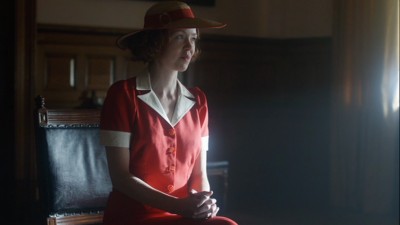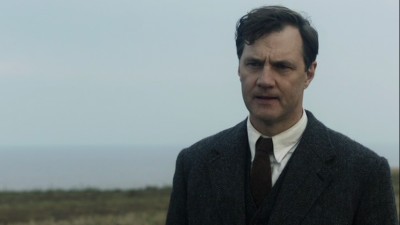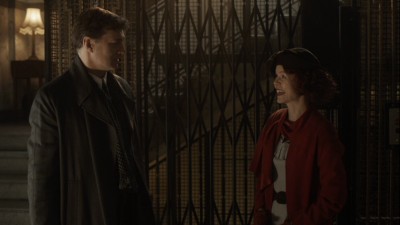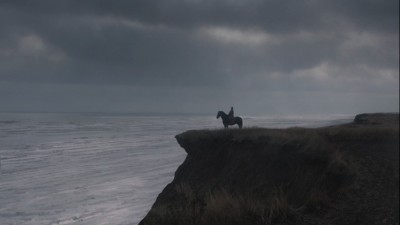| Reviews & Columns |
|
Reviews DVD TV on DVD Blu-ray 4K UHD International DVDs In Theaters Reviews by Studio Video Games Features Collector Series DVDs Easter Egg Database Interviews DVD Talk Radio Feature Articles Columns Anime Talk DVD Savant Horror DVDs The M.O.D. Squad Art House HD Talk Silent DVD
|
DVD Talk Forum |
|
|
| Resources |
|
DVD Price Search Customer Service #'s RCE Info Links |
|
Columns
|
|
|
South Riding
It may be based on unkind and unfair stereotypes about the fare on PBS and British TV, but I immediately experience apprehension when I realize that a made-for-TV drama carries the Masterpiece Theater and BBC brands--as does the miniseries, South Riding, here under review. I suspect that the program will be too self-consciously "tasteful" and "high-quality" for its own good; that its execution will shy away from or sweep under the rug anything too raw or unsettling in the material; in short, that it will be forgettably middlebrow--safe and healthy as milk, and about as interesting or compelling. (This fear is not exactly laid to rest by this particular DVD's truly uninspired cover art.) Fortunately, South Riding, the three hour-long parts of which were directed by TV veteran Diarmiud Lawrence and written by Andrew Davies (who co-created the BBC's popular Bleak House miniseries starring Gillian Anderson), for the most part evades the potential pitfalls of its pedigree, giving sometimes flawed but usually enjoyable and insightful expression to the rich interpersonal, social, and political relationships and intrigues of the popular 1936 British novel by Winifred Holtby, which has proved a perennially popular source for film, TV, and radio adaptations.


The opposed roles of South Riding's principal characters, Sarah Burton (Anna Maxwell Martin, Bleak House) and Robert Carne (David Morrissey, whose turn in the great Red Riding films, set 40 years later, previously found him in the very Yorkshire in which South Riding is set) are set up in the opening credits of the first episode, as South Riding native Ms. Burton, fresh from Oxford, races home by high-powered locomotive to become headmistress of Kiplington Girl's School. This is crosscut with Mr. Carne, an impoverished remnant of England's entrenched aristocracy, navigating the countryside on horseback. Yes, the cigarette-smoking, smartly dressed, train-taking Ms. Burton is a righteous socialist reformer, and modern; of course, the horsebound failed aristocrat Mr. Carne is a fusty conservative, and old-fashioned. These distinctions are cut and dried; too cut and dried. South Riding thus sets itself the storytelling challenge of deepening and nuancing its two protagonists, and it acquits itself fairly well, recounting in a convincing and insightful way both the pair's clashes and their moments of mutual tolerance and understanding, without creating unequivocal heroes or villains, or resorting to too-tidy reconciliations or simplistic "opposites attract" clichés.
South Riding's time and place--the between-the-wars, Depression-struck 1930s, in one of England's less prosperous locales--offer plenty of catalysts for flare-ups of conviction and conflict. The unprecedentedly horrific WWI, of which Mr. Carne is a veteran and to which the pacifist Ms. Burton lost her fiancé, looms over everything, as do the widespread privations of the Depression, which cause problems directly for both Mr. Carne's jeopardized family estate and Ms. Burton's idealistic notions of establishing new and costly public projects to improve everyone's lives.

In their public and professional modes, what both Ms. Burton and Mr. Carne perpetually and in their own ways grapple with is an economic disparity in South Riding that means, among other things, that the facilities with which Ms. Burton is charged unacceptably outmoded and run-down, and her most talented student, Lydia--a poor girl who lives in the town's unhygienic outlying slums, or "shacks," with her usually pregnant mother, hardworking and kindly father, and too many brothers and sisters--is in danger of wasting her gift for poetry and losing her scholarship and bright academic future, a crisis Ms. Burton means to avert. Meanwhile, not everything is peachy in the upper crust; in addition to the failure of his fortune, the impending loss of his home, and the sudden physical attacks he has as a result of his war service, Mr. Carne has a wife, Muriel, who is a permanent resident of a mental hospital, and a daughter, Midge, who seems headed down the same path (until Ms. Burton attempts to intervene). In the background of all this, but overlapping to bring the disparate characters and storylines together, is the local council's acceptance of the urgent need to demolish the shacks and put up new public housing for the area's poorer families--a project that soulless politician Anthony Snaith (Peter Firth) and hapless, lecherous minister Alfred Huggins (John Hinshaw) are plotting, both with and against each other, to manipulate to their own personal ends.
Ms. Burton's and Ms. Carnes's shared, if conflicting, passions about the war and the economy are founded on real experience and loss, allowing us to better understand their convictions, and holding out the possibility of them better understanding one another. The attraction between the two may seem obvious, but as written by Hortby and Davies, and played by Martin (who brings just the right mix of arrogance and vulnerability to Ms. Burton) and Morrissey (who deserves a better chance to exploit his leading-man potential than he was offered opposite Sharon Stone in Basic Instinct 2) it's a suitably complex and unpredictable dramatic contrivance that works rather well, complicated as it is by the presence of the more enlightened but paradoxically less interesting councilman Joe Astell (Douglas Henshell), a much better match for Ms. Burton, but lacking Mr. Carne's ability to connect with her in a romantically compelling way. In South Riding, this love triangle rests precariously at the peak of a mass of characters, differentiated by class and luck, whose conflicting interests, desires, and circumstances are all attended to satisfyingly enough to warrant the series' three-hour running time, and make them consistently involving.
Furthering our engagement with the material is director Diarmiud Lawrence and DP Alan Almond's camera style, which tends to the visually sensuous; the fact that South Riding is bordered by the sea and surrounded by some quite beautiful scenery is not lost on them. This visual richness is amplified by the perfect, carefully detailed, but not overemphasized period costumes, sets, and props. Timid, overly tasteful, or too mild-mannered are thus not the applicable pejoratives for South Riding. If anything, Lawrence overcorrects, and sometimes seems to be trying too hard to compensate for his film's television destination by artificially pumping it up to an unnecessary excitement level and stuffing it with "cinematic" touches--cinematic meaning to him, evidently, lots and lots of score (Robert Lane's often gorgeous and apt score is simply too much in spots and overutilized by Davies in general) and up-to-date-seeming editing and handheld posturing that undermines some important scenes, and makes others seem too rushed and perfunctory. These flaws are not fatal, but an overeagerness for polish and intensity has, paradoxically, the same effect as too much "tasteful" restraint; it dulls the power of this or that scene or moment frequently enough to make the series' pleasures more modest than they might otherwise have been.
THE DVD:
DV will simply never have the texture of celluloid, but Davies and videographer Alan Almond employ the bright clarity now allowed by the format, and some very skillful lighting and composition, to create accomplished visuals that are done full justice by the transfer to DVD; the 1.78:1 anamorphic transfer on the DVD had no glitches or flaws that I could detect. As usual, the digital source material appears particularly crisp and bright on digital media, and the series' more difficult to achieve semblance of warmth, and richness/variation of color has also been carried over in full to the disc.

The digital stereo surround mix of the original broadcast is preserved on the DVD, and the sound is beautiful--clear and robust. There is no hint anywhere of feedback or distortion; Robert Lane's orchestral score seems to shimmer in the speakers, and the dialogue is always vibrant and full, without ever overwhelming other sonic elements.
Extras:No extras.
FINAL THOUGHTS:While fumbling at times out of an apparent overeagerness to energize and impress, resulting in an occasional veer toward the glossily mediocre, South Riding, considered as a whole, is a solid, involving, often quite good miniseries, an adaptation of a novel that brings to the screen some of that medium's multilayered expansiveness. Enough of the series' fine qualities--the acting above all, but also the significantly better than expected visual sensibility for a made-for-TV program--are left undiminished by stylistic missteps to earn an only somewhat qualified endorsement. Recommended.
|
| Popular Reviews |
| Sponsored Links |
|
|
| Sponsored Links |
|
|
| Release List | Reviews | Shop | Newsletter | Forum | DVD Giveaways | Blu-Ray | Advertise |
|
Copyright 2024 DVDTalk.com All Rights Reserved. Legal Info, Privacy Policy, Terms of Use,
Manage Preferences,
Your Privacy Choices | |||||||














